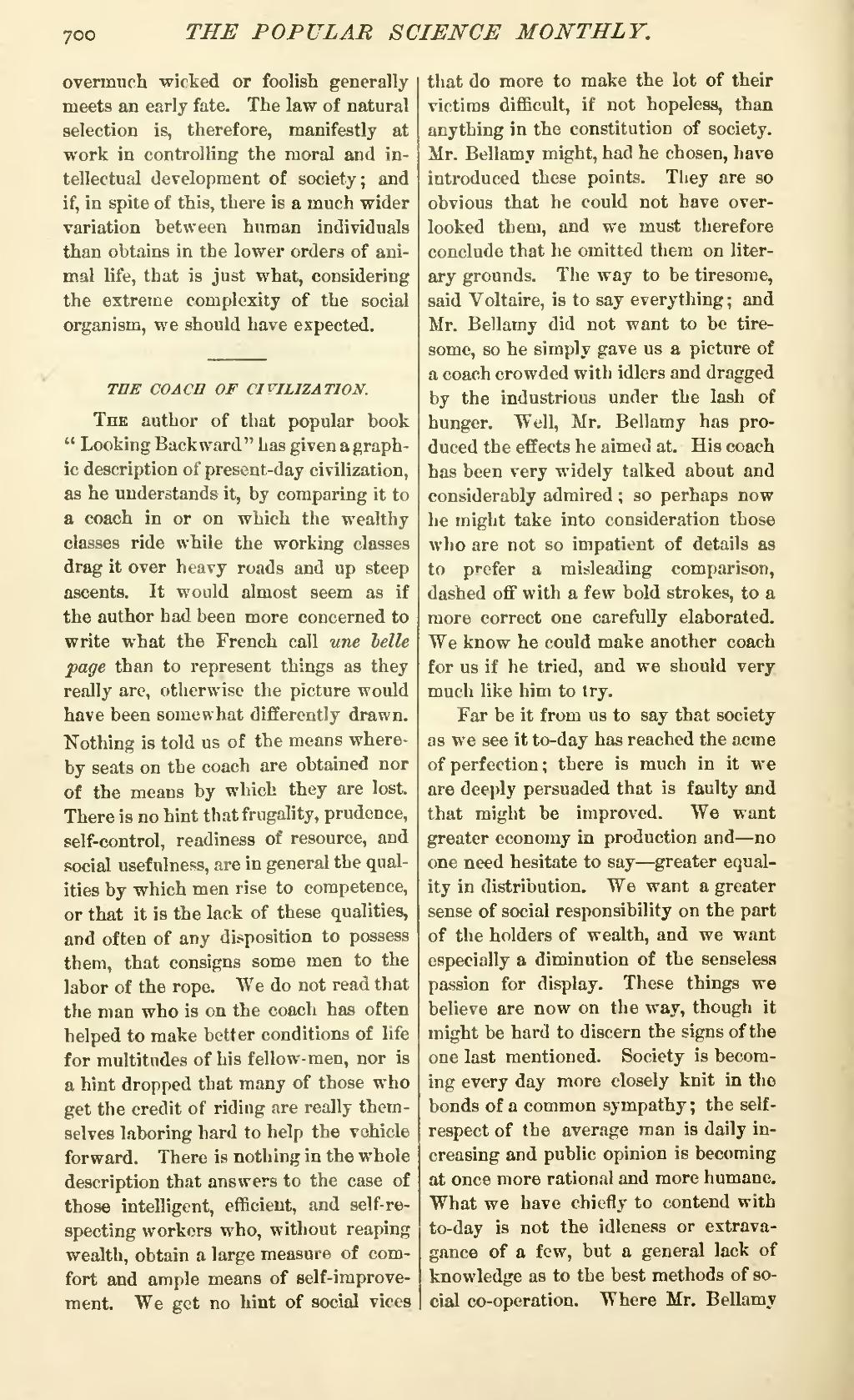overmuch wicked or foolish generally meets an early fate. The law of natural selection is, therefore, manifestly at work in controlling the moral and intellectual development of society; and if, in spite of this, there is a much wider variation between human individuals than obtains in the lower orders of animal life, that is just what, considering the extreme complexity of the social organism, we should have expected.
THE COACH OF CIVILIZATION.
The author of that popular book "Looking Backward" has given a graphic description of present-day civilization, as he understands it, by comparing it to a coach in or on which the wealthy classes ride while the working classes drag it over heavy roads and up steep ascents. It would almost seem as if the author had been more concerned to write what the French call une belle page than to represent things as they really are, otherwise the picture would have been somewhat differently drawn. Nothing is told us of the means whereby seats on the coach are obtained nor of the means by which they are lost. There is no hint that frugality, prudence, self-control, readiness of resource, and social usefulness, are in general the qualities by which men rise to competence, or that it is the lack of these qualities, and often of any disposition to possess them, that consigns some men to the labor of the rope. We do not read that the man who is on the coach has often helped to make better conditions of life for multitudes of his fellow-men, nor is a hint dropped that many of those who get the credit of riding are really themselves laboring hard to help the vehicle forward. There is nothing in the whole description that answers to the case of those intelligent, efficient, and self-respecting workers who, without reaping wealth, obtain a large measure of comfort and ample means of self-improvement. We get no hint of social vices that do more to make the lot of their victims difficult, if not hopeless, than anything in the constitution of society. Mr. Bellamy might, had he chosen, have introduced these points. They are so obvious that he could not have overlooked them, and we must therefore conclude that he omitted them on literary grounds. The way to be tiresome, said Voltaire, is to say everything; and Mr. Bellamy did not want to be tiresome, so he simply gave us a picture of a coach crowded with idlers and dragged by the industrious under the lash of hunger. Well, Mr. Bellamy has produced the effects he aimed at. His coach has been very widely talked about and considerably admired; so perhaps now he might take into consideration those who are not so impatient of details as to prefer a misleading comparison, dashed off with a few bold strokes, to a more correct one carefully elaborated. We know he could make another coach for us if he tried, and we should very, much like him to try.
Far be it from us to say that society as we see it to-day has reached the acme of perfection; there is much in it we are deeply persuaded that is faulty and that might be improved. We want greater economy in production and—no one need hesitate to say—greater equality in distribution. We want a greater sense of social responsibility on the part of the holders of wealth, and we want especially a diminution of the senseless passion for display. These things we believe are now on the way, though it might be hard to discern the signs of the one last mentioned. Society is becoming every day more closely knit in the bonds of a common sympathy; the self-respect of the average man is daily increasing and public opinion is becoming at once more rational and more humane. What we have chiefly to contend with to-day is not the idleness or extravagance of a few, but a general lack of knowledge as to the best methods of social co-operation. Where Mr. Bellamy
